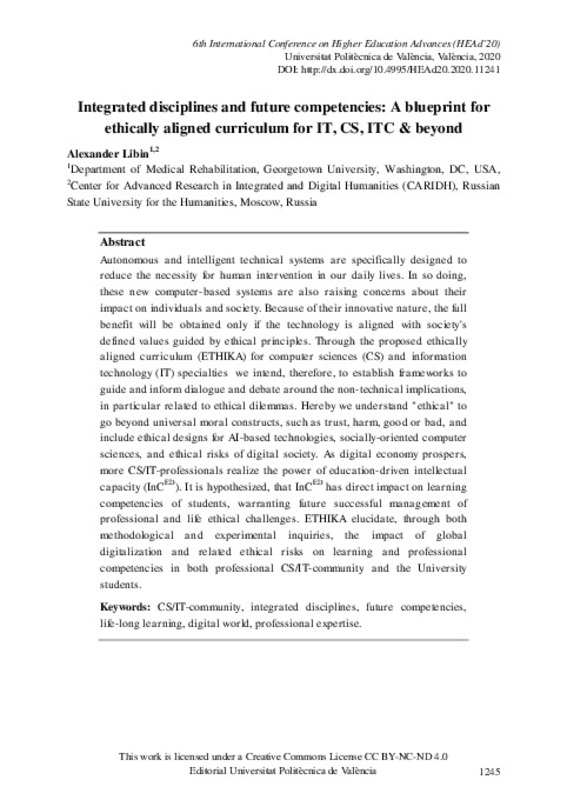JavaScript is disabled for your browser. Some features of this site may not work without it.
Buscar en RiuNet
Listar
Mi cuenta
Estadísticas
Ayuda RiuNet
Admin. UPV
Integrated disciplines and future competencies: A blueprint for ethically aligned curriculum for IT, CS, ITC & beyond
Mostrar el registro sencillo del ítem
Ficheros en el ítem
| dc.contributor.author | Libin, Alexander
|
es_ES |
| dc.date.accessioned | 2020-06-15T05:55:41Z | |
| dc.date.available | 2020-06-15T05:55:41Z | |
| dc.date.issued | 2020-05-02 | |
| dc.identifier.isbn | 9788490488119 | |
| dc.identifier.issn | 2603-5871 | |
| dc.identifier.uri | http://hdl.handle.net/10251/146317 | |
| dc.description.abstract | [EN] Autonomous and intelligent technical systems are specifically designed to reduce the necessity for human intervention in our daily lives. In so doing, these new computer-based systems are also raising concerns about their impact on individuals and society. Because of their innovative nature, the full benefit will be obtained only if the technology is aligned with society's defined values guided by ethical principles. Through the proposed ethically aligned curriculum (ETHIKA) for computer sciences (CS) and information technology (IT) specialties we intend, therefore, to establish frameworks to guide and inform dialogue and debate around the non-technical implications, in particular related to ethical dilemmas. Hereby we understand "ethical" to go beyond universal moral constructs, such as trust, harm, good or bad, and include ethical designs for AI-based technologies, socially-oriented computer sciences, and ethical risks of digital society. As digital economy prospers, more CS/IT-professionals realize the power of education-driven intellectual capacity (InCED). It is hypothesized, that InCED has direct impact on learning competencies of students, warranting future successful management of professional and life ethical challenges. ETHIKA elucidate, through both methodological and experimental inquiries, the impact of global digitalization and related ethical risks on learning and professional competencies in both professional CS/IT-community and the University students. | es_ES |
| dc.language | Inglés | es_ES |
| dc.publisher | Editorial Universitat Politècnica de València | es_ES |
| dc.relation.ispartof | 6th International Conference on Higher Education Advances (HEAd'20) | |
| dc.rights | Reconocimiento - No comercial - Sin obra derivada (by-nc-nd) | es_ES |
| dc.subject | Higher Education | es_ES |
| dc.subject | Learning | es_ES |
| dc.subject | Educational systems | es_ES |
| dc.subject | Teaching | es_ES |
| dc.subject | CS/IT-community | es_ES |
| dc.subject | Integrated disciplines | es_ES |
| dc.subject | Future competencies | es_ES |
| dc.subject | Life-long learning | es_ES |
| dc.subject | Digital world | es_ES |
| dc.subject | Professional expertise | es_ES |
| dc.title | Integrated disciplines and future competencies: A blueprint for ethically aligned curriculum for IT, CS, ITC & beyond | es_ES |
| dc.type | Capítulo de libro | es_ES |
| dc.type | Comunicación en congreso | es_ES |
| dc.identifier.doi | 10.4995/HEAd20.2020.11241 | |
| dc.rights.accessRights | Abierto | es_ES |
| dc.description.bibliographicCitation | Libin, A. (2020). Integrated disciplines and future competencies: A blueprint for ethically aligned curriculum for IT, CS, ITC & beyond. En 6th International Conference on Higher Education Advances (HEAd'20). Editorial Universitat Politècnica de València. (30-05-2020):1245-1251. https://doi.org/10.4995/HEAd20.2020.11241 | es_ES |
| dc.description.accrualMethod | OCS | es_ES |
| dc.relation.conferencename | Sixth International Conference on Higher Education Advances | es_ES |
| dc.relation.conferencedate | Junio 02-05,2020 | es_ES |
| dc.relation.conferenceplace | València, Spain | es_ES |
| dc.relation.publisherversion | http://ocs.editorial.upv.es/index.php/HEAD/HEAd20/paper/view/11241 | es_ES |
| dc.description.upvformatpinicio | 1245 | es_ES |
| dc.description.upvformatpfin | 1251 | es_ES |
| dc.type.version | info:eu-repo/semantics/publishedVersion | es_ES |
| dc.description.issue | 30-05-2020 | |
| dc.relation.pasarela | OCS\11241 | es_ES |








